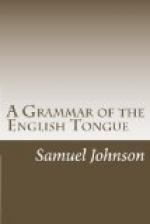* * * * *
Of adjectives.
Adjectives in the English language are wholly indeclinable; having neither case, gender, nor number, and being added to substantives in all relations without any change; as, a good woman, good women, of a good woman; a good man, good men, of good men.
The Comparison of Adjectives.
The comparative degree of adjectives is formed by adding er, the superlative by adding est, to the positive; as, fair, fairer, fairest; lovely, lovelier, loveliest; sweet, sweeter, sweetest; low, lower, lowest; high, higher, highest.
Some words are irregularly compared; as, good, better, best; bad, worse, worst; little, less, least; near, nearer, next; much, more, most; many (for moe), more (for moer) most (for moest); late, later, latest or last.
Some comparatives form a superlative by adding, most, as nether, nethermost; outer, outermost; under, undermost; up, upper, uppermost; fore, former, foremost.
Most is sometimes added to a substantive, as, topmost, southmost.
Many adjectives do not admit of comparison by terminations, and are only compared by more and most, as, benevolent, more benevolent, most benevolent.
All adjectives may be compared by more and most, even when they have comparatives and superlatives regularly formed; as, fair, fairer, or more fair; fairest, or most fair.
In adjectives that admit a
regular comparison, the comparative more is
oftener used than the superlative
most, as more fair is oftener written
for fairer, than most fair
for fairest.
The comparison of adjectives is very uncertain; and being much regulated by commodiousness of utterance, or agreeableness of sound, is not easily reduced to rules.
Monosyllables are commonly compared.
Polysyllables, or words of more than two syllables, are seldom compared otherwise than by more and most, as, deplorable, more deplorable, most deplorable.
Dissyllables are seldom compared if they terminate in some, as fulsome, toilsome; in ful, as, careful, spleenful, dreadful; in ing, as trifling, charming; in ous, as porous; in less, as, careless, harmless; in ed, as wretched; in id, as candid; in al, as mortal; in ent, as recent, fervent; in ain, as certain; in ive, as missive; in dy, as woody; in fy, as puffy; in ky, as rocky, except lucky; in my, as roomy; in ny, as skinny; in py, as ropy, except happy; in ry, as hoary.




